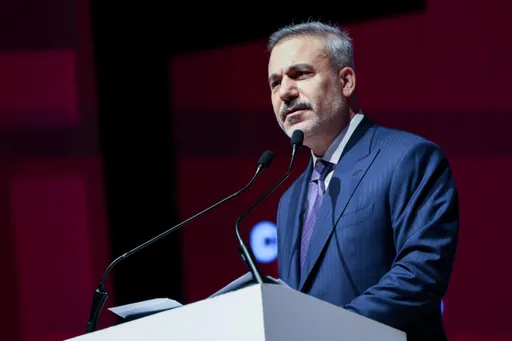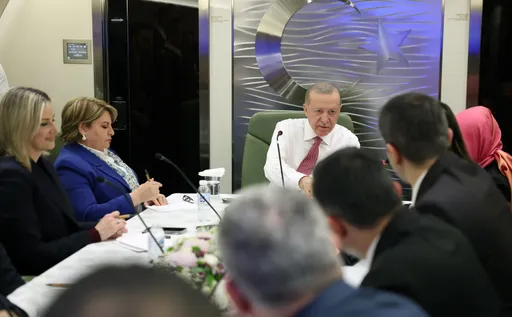Of all the problems that artificial intelligence (AI) has been harnessed to solve, the messy and complex terrain of human political affairs is one that has remained beyond its scope of application.
That might not be for long, as one Danish political party is hoping to usher in a new era of human-algorithmic civic partnership.
Launched in May, Det Syntetiske Parti (The Synthetic Party), which aims to be “the last new party in Denmark”, is breaking ground by deriving its policies entirely using AI.
Designed and programmed by the artistic collective Computer Lars in partnership with the tech nonprofit MindFuture Foundation, the algorithmic party hopes to stand in the country’s next general election in June 2023, with the intention of targeting the 20 percent of Danes that did not vote in the previous 2019 election.
For Asker Bryld Staunaes, one of the founding members of the Computer Lars collective, The Synthetic Party represents “the political vision of the common person”.
The motivation is to “take AI into the human realm of debate and discourse,” Bryld Staunaes tells TRT World. He notes that till now, there has been no way to concretely address humans and AI within a democratic context.
The public can interact with the party’s AI on the messaging platform Discord via chatbots, where people can meet the figurehead Leader Lars, the party secretary Computer Lars, and the chatbot incarnation of all the party’s members.
“Computer Lars curates the Discord server to educate people on how to use the AI as a means of political exploration,” Bryld Staunaes says. “It can tell us quite a lot about the political vision and discourse of normal people.”
While many find it unfamiliar to engage with a non-human entity, Bryld Staunaes believes it is a challenge that can be overcome, highlighting the growing enthusiasm behind human-AI interactions on the server.
“On Discord, we have this political development that primarily focuses on making the AI responsible and accountable for the power it already exercises,” he says. “It tries to widen the imaginary on how we can work together in a better way.”
The Synthetic Party is one of over 230 ‘micro-parties’ in Denmark created over the years, most of them based on critiquing society rather than formulating policy to solve societal issues.
Whether the party gains a footing with the public to formally be included in next year’s poll, however, remains unclear. In Denmark, a party needs 20,182 signatures to stand in the parliamentary election, and official data shows The Synthetic Party has just four at the moment.
If it happens to win a parliamentary seat, the party has announced that it will use its mandate to appoint a representative in charge of ensuring a link between AI and the debates organised in parliament.
AI-driven policies
To come up with a manifesto, the AI has trawled through the programs of micro-party organisations in the country from 1970 till the present, allowing it to churn out a comprehensive platform that would intersect with disaffected voters who did not feel represented by the existing political system.
Having processed all the available data, the AI can come up with hundreds of different suggestions in a short amount of time, says Bryld Staunaes. “We try to focus on some specific ideas through interaction with the public to show that ‘ok, here the AI breaks with the political imaginary, so let’s talk more about that,” he explains.
One of those proposals is the establishment of a universal basic income (UBI) of 100,000 Danish kroner per month ($13,700), which is over double the average salary in the Nordic country.
Another is inspired by the “kleroterion”, which dates back to Ancient Greek democracy. In this instance, there would be an AI-driven lottery where all parliamentary members are randomly replaced by citizens every month.
The rationale behind the suggestion, Bryld Staunaes argues, is because the “AI knows that many of these micro-parties are talking about direct democracy and are tired of representative democracy.”
“The western system is not really working after the breakdown of public discourse in the age of social media algorithms.”
An initiative also supported by the party, described as “Life with Artificials”, has been proposed as the 18th Sustainable Development Goal (SDG) that would complement the UN’s existing 17 SDGs.
According to MindFuture, the 17 SDGs are presently “insufficient to address the challenge of living with ‘Artificials’ as they do not include the development of next-generation humanized AI-technology.”
Going global
The Synthetic Party is not the first time AI has been deployed in the political realm.
In 2018, an AI candidate stood for mayoral elections in Japan, while a Russian chatbot called Alisa ran against Vladimir Putin in the 2018 presidential elections. Sam, a virtual politician, stood for the 2020 elections in New Zealand.
All of these cases were limited to digital avatars of a politician. The Synthetic Party, in comparison, attempts to go further in examining how AI can function in a political system.
Meanwhile, the party has managed to gain some traction internationally too, with Bryld Staunaes mentioning how people from Colombia, Spain and Moldova have reached out to discuss avenues for collaboration. The idea of Synthetic Party offshoots applied to diverse cultural and linguistic settings is one that intrigues Bryld Staunaes moving forward.
For now, the immediate goal for the party is campaigning to educate the public on “how to relate to and converse with AI in a democratic setting,” he says. This includes a series of election rallies have been planned in September and October, workshops for primary school students, lectures at Aarhus University, and outreach with firms from the Danish IT industry.
“We have produced a lot of election material like flyers and slogans [that] concretely show AI can not only render our public opinion, but also be a part of civic life,” Bryld Staunaes adds.
























